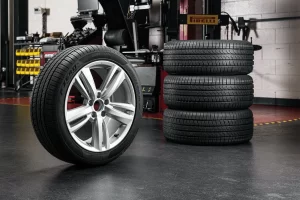
Top winter tires for 2024: safety meets performance
With winter approaching, the importance of the right tires for your vehicle cannot be overstated. Winter tires are essential to ensure safety and optimal performance in cold, icy and snowy conditions. The 2024 market will see innovative trends in tire technology, balanced performance, durability and safety. This article takes a deep dive into the world of winter tires, highlighting the best options for this season and what sets them apart.
Read more about winter tires
Winter tires are designed to provide superior traction and handling in cold weather conditions compared to all-season tires. They feature a softer rubber compound, a deeper tread pattern and biting edges for driving in snow and ice. Understanding the unique characteristics of winter tires is essential to understanding their importance to winter driving safety.
Most important features of top winter tires
The best winter tires of 2024 feature advanced tread designs and rubber compounds that remain flexible in cold temperatures for better grip. Siping is the process of making small cuts in the tread to improve traction by providing an additional biting edge. Together, these properties improve the tire’s performance in winter conditions.
Top winter tires for 2024
This year’s best winter tires include premium options known for their innovative designs and materials, affordable options that don’t compromise on safety, and tires designed specifically for SUVs and trucks that provide ruggedness and stability.
Detailed reviews of the top 3 winter tires
In-depth reviews of the three best winter tires reveal their performance data, durability and price. These reviews provide a comprehensive guide to the best tires for every need and budget.
Benefits of investing in quality winter tires
Premium winter tires significantly increase safety by providing better traction and handling in adverse weather conditions. Over time, they are also a cost-effective investment that can reduce the likelihood of accidents and associated costs.
Installation and maintenance
Whether you opt for a professional installation or a DIY approach, proper installation is critical. Regular maintenance, including pressure checks and rotations, will extend the life of your winter tires and ensure consistent performance.
The impact of the climate on tire choice
The choice of winter tires should be influenced by the local climate; tires suitable for heavy snow will be different than tires suitable for icy conditions. Regional factors play a crucial role in choosing the right tire.
Technical progress in the field of winter tires
The winter tire market in 2024 will demonstrate technological advances that improve safety and performance. Innovations include improved tread patterns and compounds adapted to different winter conditions.
Consumer guide: Choosing the right winter tires
Choosing the right winter tires requires insight into tire size, value and labeling. This guide helps consumers make informed decisions based on their specific vehicle needs and driving conditions.
Common misconceptions about winter tires
There are many misconceptions about winter tires, such as their unnecessary use in certain climates or their feasibility for year-round use. This section debunks these myths and highlights the real benefits and limitations of winter tires.
Expert opinions and recommendations
Insights from industry experts and consumer reviews highlight the performance and reliability of top winter tires, providing a comprehensive market perspective.
Safety tips while driving in winter
In addition to choosing the right tires, this chapter provides important advice for safe winter driving, including tire-related tips and general safety practices.
cost analysis
Detailed cost analysis helps consumers weigh the initial costs against the long-term benefits of investing in high-quality winter tires, focusing on value for money.
finally
Choosing the right winter tires is a crucial decision that affects driving safety and performance. The 2024 market offers a range of options to meet different needs and budgets, highlighting the importance of making informed choices.
Frequently Asked Questions
What is the difference between winter tires and all-season tires?
Winter tires have a special tread design and compounds optimized for cold, icy and snowy conditions, providing better grip and handling than all-season tires.
How often should winter tires be replaced?
In general, winter tires should be replaced every 4 to 5 years, or when the tread depth is reduced to 4/32 inches.
Can I use winter tires all year round?
Winter tires are not recommended for year-round use because the soft rubber compound wears out more quickly in warm temperatures, shortening the tire’s life and performance.
Are there specific winter tires suitable for different types of vehicles?
Yes, winter tires are designed for a variety of vehicle types, including cars, SUVs and trucks, each with specific characteristics for optimal performance.
What should you pay attention to when buying winter tires for 2024?
Consider local climate, vehicle type, driving behavior and tire properties such as tread pattern, rubber compound and sipes for optimal winter performance and safety.



